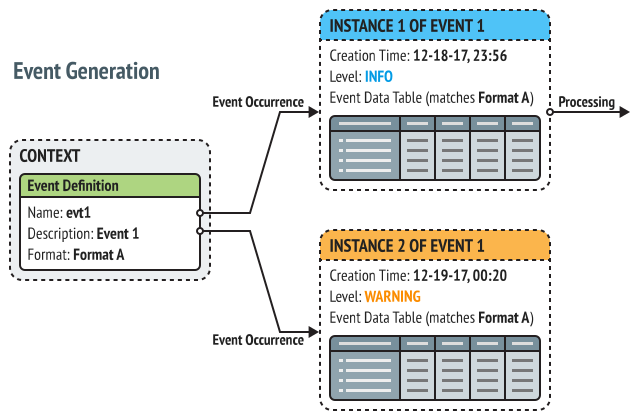Events
Events are context entities that let anyone interested know that something happened with the context or resource/system represented by it. Each event type specifies parameters of event instances that are created each time an event of specific type occurs.
Events are synonyms to notifications and messages. In Iotellect, firing an event, triggering a notification, and producing a message all together commonly refer to creating an new event instance. Events should not be mixed up with alerts that are user-defined reactions with a dedicated complex lifecycle. However, each time an alert is raised a special alert event is also created.
Each event instance has an event Data Table associated with it:
If you subscribe to events of a specific type, you’ll receive a Data Table whose format matches event definition with each new instance.
If you need to generate an event, you’ll have to construct a Data Table in the proper format that matches the definition.
Event Definition
Every event is defined in its context using an Event Definition. An Event Definition contains several options:
Event Name. Unique name of this particular event type within the context where it is defined. This string may contain only English characters, numbers, and underscore characters ("_").
Event Format. The Table Format of a Data Table representing event-specific data.
Description. Human-friendly description of the event.
Help. Optional detailed description of the event.
Expiration Period. Defines how long a persistent event is stored in the event history.
Level. Severity of the event. This is the default level for this event, but the actual event fired in the context may have another severity level. Available levels are described in the event levels section.
Subscription Permissions. Permission level required to receive events of this type.
Generation Permissions. Permission level required to trigger events of this type.
Group. Shows that event belongs to an event group. Groups help join similar event instances together during different operations.
Examples
Any Alert context has an alert ("Alert") event which fires when an alert is triggered.
The Root context has a login ("User Login") event which fires when a user logs in to the server.
Each Device context of an MQTT device has a message (“Message”) event created by the MQTT device driver each time a message is received from a broker. Event data table is also a single-record table that contains topic name, message payload, and other protocol-specific parameters.
Event Instances
Every time an event of a certain type occurs in a context, a separate event instance is created. This instance goes through the event lifecycle.

Was this page helpful?